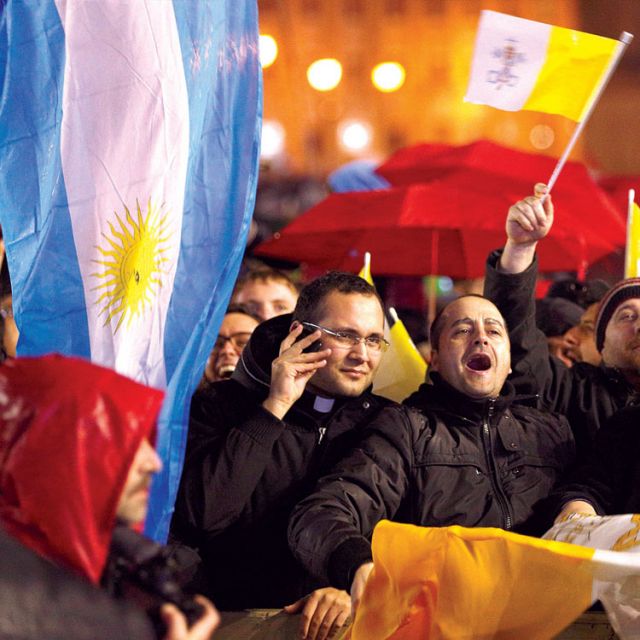“We were stunned. Happily stunned, but stunned,” said Canadian Jesuit Father Michael Rozinski, who is studying for a PhD in canon law at the Pontifical Gregorian University in Rome.
“I just thought, ‘Wow! A Jesuit! There’s a shock,’ ” said Santiago Rodriguez, a Jesuit on the long road to priesthood in the Jesuit formation program in Toronto.
In Winnipeg, Fr. Alan Fogarty told the Winnipeg Free Press about the excitement at St. Paul’s, the Jesuit high school where he is president.
“I said, ‘Whoa, it’s a Jesuit!’ ” said Fogarty.
The Jesuits are shocked, not because there’s some law of nature which prevents Jesuits from becoming bishop of Rome, but because Jesuit founder St. Ignatius didn’t want his men to climb the Church career ladder.
“We’re not supposed to accept dignities in the Church and we have a vow against it,” explains Jesuit historian Fr. Jacques Monet.
When the Jesuits were founded in 1540 the Church was in trouble — corruption, scandals, dirty money, shortages of priests, badly educated priests. Everybody talked about reform. It wasn’t just Martin Luther and his 95 theses. The first Jesuits wanted to reform the Church too, but not by changing the bishops or the rules of the Church or even the papal court that was full of intrigue and staffed through nepotism.
The Jesuit idea of reform was to get the Church back in touch with the poor, simple preacher from Galilee. Through St. Ignatius’ 30-day silent retreat, known as the Spiritual Exercises, plus basic education of children, Jesuit priests were going to trust the Church to reform itself while they reformed individual Christians and lived as companions of Jesus.
So, even today, if some nuncio comes calling to ask a Jesuit whether he would like to be bishop the Jesuit will and must say no. This will be reported to the general superior of the order in Rome, who will protest to the pope. Only the pope can release a Jesuit from his vow not to accept the office of bishop.
Becoming a bishop is often hard on a Jesuit, who must then leave the community, the structure he has built his life on since entering the novitiate, to take up his duties.
“Most of the Jesuits I know who become bishops want to remain close to the Society,” said Monet.
Over the centuries an image has built up of the Jesuits as both loyal to — and trouble for — the pope.
The order was suppressed by Pope Clement XIV in 1773 and only restored at the end of the Napoleonic wars in 1814. In 1981 Pope John Paul II put the order into a kind of theological receivership, appointing Jesuit Father Paolo Dezza to temporarily head the order rather than allow the Jesuits to elect their own Father General.
For Rodriguez the election of Pope Francis has become part of his journey toward priesthood and final vows. As a volunteer at the 2008 International Eucharistic Congress in Quebec City, Rodriguez sought out Cardinal Jorge Mario Bergoglio just weeks before entering the Jesuit novitiate.
Originally from Colombia, Rodriguez saw a fellow Latin American, a Jesuit and a leader in the Church. He wangled a brief encounter with the future Pope Francis, told him he was about to enter the Jesuits and asked for tips.
“He smiled and said, ‘Pray every day and live simply.’ That was it. It was a very short exchange,” recalled Rodriguez.
Looking back, the 30-year-old Jesuit has come to see the wisdom of that advice.
“I’ve come to realize that when you live simply, when you truly live your poverty, it also helps you to live obedience and to live chastity,” he said.
Rodriguez is not surprised by the simple, common touch of the first few days of the new papacy.
“You could tell, when you see him among the other cardinals, you could see his cassock was not the same colour of black. You could tell he didn’t take it to the same places to be dry cleaned,” said Rodriguez. “You could tell he was a much more simple person.”
The election of Pope Francis has confirmed for Rodriguez his own path as a Jesuit.
“The Holy Spirit has truly and fully inspired the cardinals to choose a man who is an example,” said Rodriguez. “We think of Marshall McLuhan and ‘The medium is the message.’ I think this Pope is the message — the way he lives simplicity, the way he lives his joy and embraces and comes into contact with people. It speaks to the way the Church has to be, open and joyful and in contact with the world.”
For all the Jesuits at the Collegio Bellarmino where Rosinski lives in Rome, that the Pope now has the Jesuit seal in the middle of his coat of arms is such a marvel it’s thrown them into a kind of giddy disorientation.
“I had a difficult time falling asleep,” recalls Rosinski of the night he rushed to St. Peter’s Square at news of white smoke.
“I think most Jesuits I know were still reeling from the news. We have a rich and complicated history, but a Jesuit pope has never been part of that history.
Having a Jesuit pope is outside the categories — and even the imagination — of most Jesuits,” Rosinski wrote in an e-mail to The Catholic Register.
Eventually Jesuit instincts kick in, even in a new situation. Regis College, the Jesuit graduate school of theology at the University of Toronto, brought together some of its professors the evening Pope Francis was to be officially installed, March 19, for a panel discussion on “The Post Modern Papacy: The Petrine Ministry as Promotion of Human and Religious Solidarity.”


